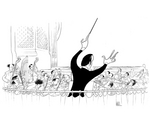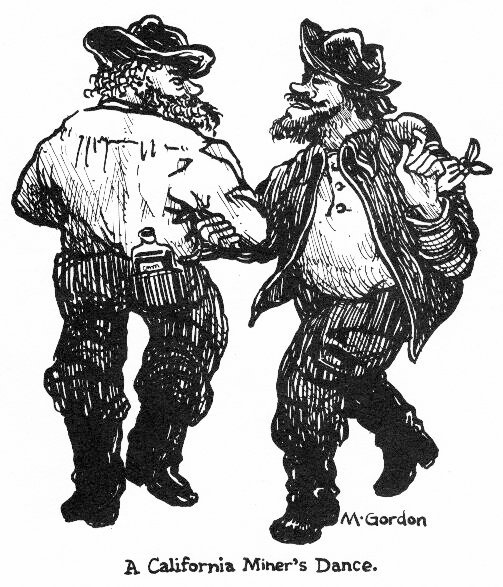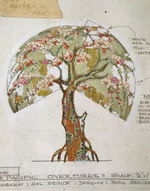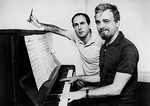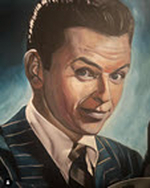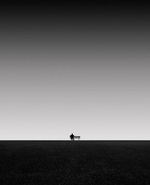Essential elements of the "Golden Age" sound
#1Essential elements of the "Golden Age" sound
Posted: 5/24/19 at 11:01am
I've been thinking lately about what made the Golden Age musicals sound the way they did, both vocally, compositionally and orchestrationally. Part of it is the unapologetic lushness of the orchestrations, so often twenty-something pieces with strings, horns and a banjo doubling a non-distorted electric jazz guitar. Another part has to be the voices: hoarse, coarse and full, with limited training, too many cigarettes and too much hard liquor, and mouths shaping vowels the way their parents, who often spoke English with an accent, taught them to.
Yet another part is the current vitality of the now-outdated dance rhythms that make up so many numbers: when someone in 1957 or 1963 wrote a song with a polka beat or a foxtrot feel, it's not the same as today, when people doing that are reaching backwards, committing pastiche whether they want to or not. Back in those days, it may not have been the majority, but people still danced- and even LISTENED to- these things.
Admittedly, I'm not nearly as much of an expert or devotee- or even fan- of the Golden Age musicals as much as some people here; I'm a late-twenties writer and sometimes composer, while to some here, based on age or even sexual orientation, these shows and sounds may have a cultural, almost religious, significance. So I turn to the experts and ask: to you, what makes the Golden Age sound so golden?
#2Essential elements of the "Golden Age" sound
Posted: 5/24/19 at 12:07pmI’d love to know if there’s a good book or write up about this - what is that sound and where does it come from? What are some examples of music that can be identified as being concrete sources for the golden age musical sound? Klezmer, Dixie, folk, operetta, salon waltzes? I was kinda bummed when Sondheim said he wouldn’t consider writing a music equivalent to his lyrics books, because I’d love to know what he had to consider in the musical construction of his songs.
#3Essential elements of the "Golden Age" sound
Posted: 5/24/19 at 12:19pm
The way shows were orchestrated during the golden age had to take into consideration that the singer needed to be clearly heard when they were singing. Rarely was the brass playing at the same time that the singer was singing. There were no body-mics like there are today.
#4Essential elements of the "Golden Age" sound
Posted: 5/24/19 at 12:20pm
I've written book and lyrics much more often than I've composed, but in part BECAUSE of how tedious and fiddly I find composing, I'm forcing myself to do more and more of it. Having written a modern pop musical score (produced), and a 1960s-1970s rock and country pastiche score (semi-produced), I'm now forcing myself out of my comfort zone to write in the style of the Golden Age. So I'm reading everything I can from the pre-Sondheim writers, analyses of their work, reading and rereading the scores, listening to recordings, trying to internalize what made that era actually work the way it did.
#5Essential elements of the "Golden Age" sound
Posted: 5/24/19 at 9:47pm
As a lyricist myself, the Golden Age songs are distinguished by the very rare use of imperfect rhymes and the almost inevitable verse + AABA chorus (the latter being most often about 32 bars) structure. And although the chorus would often repeat, each A section scanned the same as every other A section, each B the same as every other B, with a possible addition of a coda at the very end of the entire number.
The economy and consistency of this form inspired a brilliant minimalism from the best writers, composers and lyricists alike. (Hoagy Carmichael was the exception that proved the rule.)
"Chorus" in this usage doesn't refer to a group of singers, but to the repeated AABA part of a song as opposed to the "Verse", which nowadays is usually cut but if it isn't, we call it the "Intro".
In ANYTHING GOES, the verse is the "At words poetic/ I'm so pathetic/ That I always have found it best..." section. The chorus begins each repetition with "You're the top!"
(darquegk knows this, but it's surprising how many people, including professionals, do not.)
teatime2
Featured Actor Joined: 3/25/18
#7Essential elements of the "Golden Age" sound
Posted: 5/25/19 at 12:58am
I'm not sure what you mean by the voices being "coarse" and "hoarse". The Golden Age sound was full of gorgeous singers making wonderful sounds. Sure sometimes the voices were lacking but that's true even in today's time.
#8Essential elements of the "Golden Age" sound
Posted: 5/25/19 at 9:46amThe coarseness and hoarseness were sometimes more aesthetic than shortcomings. Consider it the sound of middle aged people at a time when Middle Aged people still existed. No one today sounds like the voices of the singers on “Company,” though that’s not a typical Golden Age show by any means.
#9Essential elements of the "Golden Age" sound
Posted: 5/25/19 at 10:34am
Hmm good question.
- One of the elements of "Golden Age" sound is the influence of European operetta. Good examples: "You Are Love" from Show Boat, "Wunderbar" and "So in Love" from Kiss Me Kate, "I Could Have Danced All Night" from My Fair Lady. For this reason many golden age musicals do better when the leads are operatically trained.
- The other is jazz influence. The writers of many golden age musicals wrote songs that became part of the American songbook and thus jazz standards.
- Third is incorporating vaudeville. Vaudeville was full of performers who had unique skill sets like patter song, monologues full of repetitive jokes, specialized dance numbers. Many Golden Age musicals have numbers that one could imagine on the vaudeville circuit. Examples: "If I Were a Rich Man" from Fiddler, "Get Me to the Church on Time" from My Fair Lady, "Brush Up Your Shakespeare" from Kiss Me Kate.
- Sopranos and baritones. Most of the male leads on B'way now are for tenors and many of the female leads are for mezzos. In the Golden Age the male lead was often a baritone or bass, and the lead a high soprano. Thus we have pairings like Mary Martin/Ezio Pinza, Alfred Drake/Patricia Morison, and singers like Julie Andrews and Barbara Cook.
#10Essential elements of the "Golden Age" sound
Posted: 5/25/19 at 2:48pm
In addition to the large string section (which was usually supplemented for the cast album, so what we hear on the OCR is not quite what was heard in the theater), the presence of a harp in the pit. I'm still peeved that "Curtains"--a musical set during the 1950s--had no string section in the pit at all! Good luck coming up with a large string section for your show ![]()
Compositionally, Golden Age composers (or their orchestrators) would often introduce a counter-melody in the middle of the texture...a good example is the beginning of the chorus of "A Wonderful Guy."
And yes, nowadays Broadway singers are conservatory-trained so their voices are more conventionally "beautiful" at the expense of character.
#11Essential elements of the
Posted: 5/25/19 at 6:57pm
This is such a great thread with a lot of intelligent responses! BWW at its best.
Cultural background is a big part of it. The majority of Golden Age composers were Jewish, drawing from their heritage and infusing it with modern sensibilities. Other influences included operetta, jazz (and particularly the work of black jazz artists), Tin Pan Alley, and the "pop" songs of the 20s-40s. Musical theatre has often been viewed as a generation behind, so these composers were taking music of their childhood and giving it their own spin.
I did some quick math about the ages of theatre writers, because in my head I always thought Golden Age authors were younger than today's. Not so: the average age for the composer/lyricist of each Best Musical winner from 1950-1965 is 42, and the average age of the Best Score winners of the past 15 years is 43.
Orchestration is also a huge factor, as others have said. Solo numbers had to be orchestrated with strings and light reeds behind the vocals, because an un-amplified voice can't cut through brass. Shows needed ~25 in the pit, with a ~10-piece string section (otherwise it would sound empty), 5 reeds, 6 brass, and 4 rhythm. (Bernstein talks about the importance of strings and brass working together in a West Side recording session documentary.) Auditions were held in Broadway houses, and singers had to prove they had the ability to project.
Radio was also a factor: from the 20s to 60s, "standards" came out of hit Broadway shows. Songs were being written with the hope of radio play, whereas today's composers are more focused on character and story.
To pose two sub-questions:
– What's the end of the Golden Age? It begins with Oklahoma! (1943), but some say it ended in 1959 (which was also the death of Hammerstein), others say mid-late 60s. I sort of view Fiddler (65) to be the end of one era and beginning of the next.
– If you had to choose 5 "quintessential" Broadway songs that sum up the Golden Age, what would they be?
#12Essential elements of the
Posted: 5/25/19 at 7:30pm
Rather list scores than songs:
CAROUSEL
KISS ME KATE
PAJAMA GAME
MY FAIR LADY
HELLO DOLLY
#13Essential elements of the
Posted: 5/25/19 at 11:57pm
Here is an example of Golden Age sound vs. modern sound:
Alfred Drake and Joan Roberts in "People Will Say We're In Love":
https://www.youtube.com/watch?v=t75v8AfZvm4
His rich baritone contrasts with her flute-like soprano.
Here are Rebecca Naomi Jones and Damon Daunno singing the same song:
https://www.youtube.com/watch?v=41RIkbPi2UE
I love the Jones/Daunno version. But gone is the baritone/soprano mix. Jones has a huskier mezzo, and Daunno has a high tenor voice.
#14Essential elements of the
Posted: 5/26/19 at 10:40amOne thing I keep going back to as a case study is "The Producers," one of the most successfully convincing recreations of the Golden Age sound since the Golden Age. Mel Brooks and his arranger/orchestrator distilled the sound of that era down to the last detail, although their musical vision is more a love letter to Jule Styne and Jerry Herman, while I can feel myself leaning towards Bock and Harnick and Kander and Ebb in my own specific evocation of the era.
#15Essential elements of the
Posted: 5/26/19 at 12:39pm
To pose twosub-questions:
–What's the end of the Golden Age? It begins withOklahoma!(1943), but some say it ended in 1959 (which was also the death of Hammerstein), others say mid-late 60s. I sort of viewFiddler(65)to be the end of one era andbeginning of the next.
– If you had to choose 5 "quintessential" Broadway songs that sum up the Golden Age, what would they be?"
1. I've always considered Company as the definitive end of the Golden Age and the start of contemporary. Follies, while written a year after, is very literally the death of it with the destruction of the Golden Age. Cabaret can also be seen as the end of the Golden Age with its experimentations in form and concept.
2. Five songs that are quintessential to the Golden Age:
"Cockeyed Optimist" - South Pacific
"Almost Like Being in Love" - Brigadoon
"Sit Down You're Rocking the Boat" - Guys and Dolls
"Whatever Lola Wants" - Damn Yankees
"Ya Got Trouble" - The Music Man
Choosing these five songs because they all represent a key essence of the Golden Age. All of these songs still exist in a typical AABA verse/chorus 32-bar structure like the Tin Pan Alley songs, but they also are keenly written to develop character and plot, the major advancement that defined the Golden Age. While Cole Porter had Kiss Me, Kate in this era, I would argue that it's a poor example of Golden Age because many of the songs only loosely fit character and scene. I also shy away from early R&H because, while Oklahoma! and Carousel defined the era, their forms are often very experimental. I think of the Bench Scene, which is a complexity that isn't quite returned to until Sondheim.
#16Essential elements of the
Posted: 5/26/19 at 5:20pm
^ Great summary, though I would say by your argument that "Ya Got Trouble" is also atypical of a Golden Age song given its unique reliance on rhythmic spoken word.
I put CAROUSEL in my top 5 shows to remind folks how much operetta and musical drama played a part in the greatest Golden Age shows. For every PAJAMA GAME or GUYS AND DOLLS, there was a ME & JULIET, a KISMET, or a MOST HAPPY FELLA to fan the flames of old-school operetta.
#17Essential elements of the
Posted: 5/26/19 at 6:53pm
I’m in pretty deep here, but why Oklahoma and not Show Boat? The same man was behind both productions.
Show Boat was, I believe, immediately recognized as a revolution in musical theater and its first “revival” was being planned almost before the original production had closed. What occurred in the period between the two musicals?
On another note, is Robert Russell Bennett the most neglected contributor to the Golden Era? He orchestrated almost all of the golden era musicals. I’ve read that Richard Rodgers would sometimes hand all the songs to Bennett, who would be instructed to produce an overture. I can listen to the Overture from South Pacific about 15-20 times in succession.
#18Essential elements of the
Posted: 5/26/19 at 8:02pm
OlBlueEyes, as I said in another thread, there is a doctoral dissertation in the UCLA library that tells what happened between SHOW BOAT and OKLAHOMA! It's been 20 years since I read it, but basically it shows how Hammerstein (sometimes with Kern, often with other composers) continued to refine the "integration" he and Kern had begun in SHOW BOAT. The resulting shows were often commercial failures, operettas that weren't exactly operettas any more.
As to your question "Why OKLAHOMA! rather than SHOW BOAT?", the answer is that Hammerstein finally got it right with Rodgers on the later show. Although many of the basic ingredients are there in SB, that show is still pretty loosy goosy--witness the many versions and how many songs have been replaced in revivals. That doesn't happen with OKLAHOMA! because it literally cannot; the show is so well integrated that one can't imagine replacing any number with any other by Rodgers or Hammerstein.
***
BTW and FWIW, the term "Golden Age" is not universally used as it is in this thread. To some, the "Golden Age" means pre-R&H, i.e., Berlin, Kern, Gershwin, Porter and Rodgers & Hart. The period beginning roughly in 1943 is called the "Rodgers & Hammerstein" period and I have heard academics argue that the move toward more verisimilitude in musical theater was very much a loss.
#19Essential elements of the
Posted: 5/26/19 at 8:18pm
OlBlueEyes -- I view SHOW BOAT to be the start of one "era," and OKLAHOMA! to be the start of another. Show Boat was the first successful serious book musical with songs that drove the story, but it still had elements of vaudeville and operetta, and it's sort of episodic. The 1920s to early 1940s were still populated by Ziegfeld follies, operettas, and more frivolous works where story was secondary to entertainment. Oklahoma! and the teaming-up of R&H was a seismic shift that perfected the previous 15 years' work, and so many shows after OK! tried to emulate aspects of it.
All this is subjective, but I would argue that the past 120 years of MT could be broken down as:
1900-1927
1927-1943
1943-1967 –– Golden Age
1967-1982
1983-1995 –– The British Invasion
1996 –– The Modern Era (starting with Rent, with possibly another beginning with Hamilton)
#20Essential elements of the
Posted: 5/26/19 at 9:44pm
If I could tweak your list a little more, the few changes I'd make would be to extend the Golden Age cutoff to 1970, the year of both Company and Jesus Christ Superstar's wide release. That one-two punch changed what musical theatre was forever.
Next, I'd consider the possibility of renaming the "British Invasion" the "Mega-Musical era," and extending it from 1983 through 2002. The success of Rent as the decade's defining musical is undeniable, but it didn't effectively change much or shift the culture: for the next ten years or so the zeitgeist was still on big, splashy and "corporate," with the exception of some culty shows. For reference, see the revised You're a Good Man Charlie Brown: though the textual revisions were mostly unobjectionable, nearly every critic wondered why the production had been blown up to such a large scale size-wise.
The next era, I'd call the "New Pop Era," and it seems to be marked by a slow but palpable closing of the gap between theatre music and popular music. I'm setting the start arbitrarily at "Wicked," which (despite the fact that a good portion of the score is intentionally unmelodic, dissonant epic weirdness of Schwartz's Children of Eden style) managed to create a few genuine pop standards, get some crossover play, and whose songs have been sampled by mainstream artists. The REAL undisputed start of the New Pop Era comes in 2006, when the enormous, unexpected cultural phenomenon that was High School Musical dropped. Though widely mocked by adults and academics and so-called "people of good taste" when it premiered, the movie musical managed to have character-developing numbers, dance showstoppers and plot-movers, all essential forms of theatre song, but in genuine, unsimulated pop music form. You can draw a direct line from High School Musical to the rise of Pasek and Paul- without Troy and Gabriella, there would be no musical language for Evan Hansen or Barnum.
Hamilton is still the obvious high point of the New Pop Era so far, but other key factors I'd point to are "Let it Go" and the Adele Dazeem gaffe making Idina Menzel a household name, the parade of legitimate 90s and 2000s alternative rock legends through the St Jimmy role in American Idiot, and Sara Bareilles's starring in- and releasing a pop album of music from- Waitress.
#21Essential elements of the
Posted: 5/26/19 at 10:58pm
darquegk said: "You can draw a direct line from High School Musical to the rise of Pasek and Paul- without Troy and Gabriella, there would be no musical language for Evan Hansen or Barnum."
Oy. Not necessarily disagreeing with you, but...oy.
I would also agree that Rent didn't have as much of an immediate cultural impact as Disney and Beauty, which encouraged other film studios to exploit their IP. The Producers also encouraged some of the stage-to-screen adaptations in the early aughts. Also Mamma Mia (and later Jersey Boys) with jukebox musicals.
Like Rent, we haven't really seen the impact Hamilton has had on the writing culture yet. You could maybe argue it has encouraged more diversity in casting, and it might have paved the way for Great Comet to come to Broadway, but I think Hamilton is an anomaly.
#22Essential elements of the
Posted: 5/27/19 at 12:01am
I am LOVING this thread.
A subject that has swirled in my mind for a while.
Just an aside, and possibly an addition to the coversation....
Back when Quincy Jones recorded Q's Juke Joint, it was known that Brandy ran out of the studio while recording a remake of Michael Ja kson's ROCK WITH YOU. She said that she just couldn't get the vocal arrangement of the original. It was then said that the younger singers of the time were not used to that style. Fast forward to today and I have found that some younger people singing music from the Golden Age sometimes sound as if they are doing karoke. They just can't find that vocal flow of the music but tbose of us who grew up at that time can perfectly sing along with the music.
So I just wonder at times what made it different. And for that matter, the music before it. I find it interesting.
#23Essential elements of the
Posted: 5/27/19 at 12:40am
I dont know how Show Boat can not be considered a Golden Age musical. It has many of the facets of a Golden Age musical:
1) A more serious musical book that mixes comedy with darker, more mature themes. It's very different from the frothy fair of most other musicals of its time.
2) The multi-ethnic musical influence: a mix of operetta, jazz, and African American spirituals.
3) The need for more substantial voices: Show Boat is now often done in opera houses because it works best with operatically trained voices.
4) The vaudeville acts: as I said, most Golden Age musicals have a few numbers that seem tailored to the specific skills of a vaudeville act, and Show Boat is no exception. Frank and Ellie could be a vaudeville act. It's very similar to the way Doolitle's musical numbers in My Fair Lady were specifically designed for Stanley Holloway who used to mix song, dance, and jokes in his act.
5) It has Oscar Hammerstein's lyrics. Oscar Hammerstein in 1927 already had many of the attributes that we would see later, particularly his strong social justice warrior tendencies.
6) Show Boat might be the first meta-musical, in that the main subject of the musical is ... music. How musical traditions are handed down from one generation to the next, how different segregated societies back in the day nonetheless took ideas from each others' music, and most of all, how music is the universal language that brings people together.
While I agree Show Boat chronologically is too early to fall in the Golden Age musical era it definitely was very ahead of its time and I think is a Golden Age musical.
#24Essential elements of the
Posted: 5/27/19 at 6:56am
I’d say that SHOWBOAT was indeed golden but it was certainly not a part of anything I would call an “age” of greatest musicals. Many shows between 1927 and 1943 have brilliant songs, but I can count one hand the shows of that era that could stand up today (GIRL CRAZY, ANYTHING GOES, PORGY AND BESS, ON YOUR TOES, PAL JOEY, LADY IN THE DARK— okay, it took an extra finger, but honestly, what have I missed?)
I feel that the true Golden Age begins in 1940, the year Rogers and Hart made a heel the centerpiece of a new kind of musical (PAL JOEY). And I feel the Golden Age ends somewhere around 1965 with FIDDLER. The next year begins the era of the ascendant Concept Musical, typified with CABARET, I DO I DO, and THE APPLE TREE, and the start of the halcyon years of Kander & Ebb/ Sondheim and Prince.
#25Essential elements of the
Posted: 5/27/19 at 10:15am
I agree that Oklahoma is much more integrated than Show Boat, but in almost every other way Show Boat is a much grander musical. PoisonIvy covers most of the areas of innovation in Show Boat, including the insight into the the way that the evolution of the music itself is displayed. The score itself contains the great anthem that brought tears to the eyes of Martin Luther King.
My question is why Show Boat became so untidy. In the Hal Prince revival the dirge "Mis'ry's Comin' Aroun" sets the tone for the first act. I've read that Kern feared the removal of the song and insisted that it be included in the overture.
How is it that the creatives had so little influence on the finished product? Was it because Ziegfeld was the initial producer and he had the final say and he was not at all accustomed to having very dark songs in his productions? The second, or perhaps the first most influential Show Boat production was the highly successful 1951 MGM film produced by Arthur Freed. MGM did not like to be tied down in its adaptations of Broadway musicals. Marge and Gower Champion were an act that merited two full dance numbers. Magnolia and Gay on their re-introduction had to be young enough to have a second chance and Julie -- well still not much hope for Julie.
I suppose that if the rocky course followed by Show Boat was primarily the result of strong-willed producers, there would be no need for a doctoral dissertation.
I was excited about the arrival of the Prince revival, and took from the library John McGlinn's three disk album of every song ever written for a Show Boat production. It features Frederica von Stade and Dawn Upshaw. So many songs, so little time.
A director contemplating a Show Boat revival has many decisions to make with respect to the songs to be used and the direction that the second act will take. This all comes back to Gaveston's thought that Show Boat was not a tightly integrated musical compared to Oklahoma and more work had to be done. I would just suggest that the musical would have been more tightly integrated if composer and lyricist had had their way. I suppose that the shows named by Someone in a Tree could be thought of as musicals along the path from Show Boat to Oklahoma, but were mostly not of the same quality of Show Boat and Oklahoma, and are not included in discussions.


